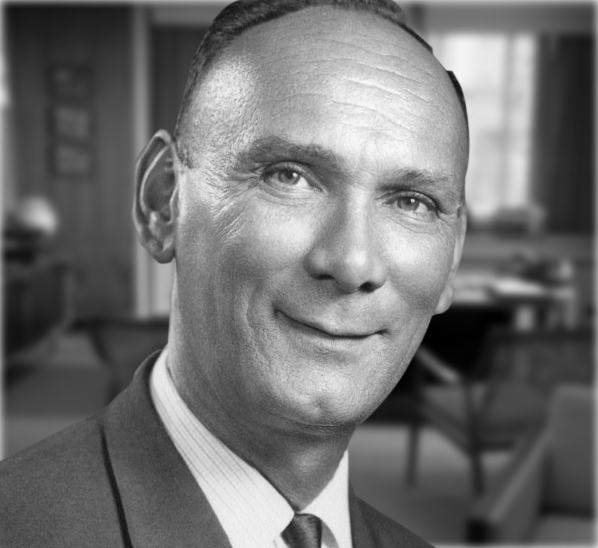- A refugee from Shanghai, where he had spent his life, GUS BORGEEST and his Chinese wife, Mona, landed in Hong Kong in 1951 with two Hong Kong dollars in their pockets.
- All good land was occupied, but he found an island of 200 rockstrewn acres so barren no one lived there.
- The RMAF Board of Trustees recognizes his establishing of a model for resettlement and rehabilitation of refugees that enhances their self-respect and productive capabilities.
A refugee from Shanghai, where he had spent his life, Gus BORGEEST and his Chinese wife, Mona, landed in Hong Kong in 1951 with two Hong Kong dollars in their pockets. Having to start over himself, he was yet mindful of the needs of others in more dire plight in keeping with his Quaker philosophy: “My neighbor is my business.”
Formerly a production expediter in a textile mill, he soon found employment in the Government vegetable marketing and social welfare agencies. For thousands of families crowding into Hong Kong from the mainland, there then was little more in store than a food dole and shelter in a squalid squatter camp until they could be accommodated in housing the Government was beginning to construct.
Visiting regularly these impoverished refugees, he learned that many once were proud farmers. Convinced that “welfare with best intentions was subtly enslaving them,” he determined to find a self-help route to rehabilitation that would be economically sound and restore their dignity.
All good land was occupied, but he found an island of 200 rockstrewn acres so barren no one lived there. Leasing it from the Government for 180 Hong Kong dollars a year, he then studied books and sought the help of official agriculturists to learn about farming marginal land.
Using savings of two frugal years to buy tents, cots, a few tools and some food, he, his wife, their adopted daughter and two refugee families transported themselves by rented sampan to the island in mid 1953. Defying the first stormy night, he renamed their new home “Sunshine Island,” symbolic of his aim to bring light to darkened lives. A typhoon washed out the first grass huts and tediously planted gardens. Financial crises were chronic. Some new arrivals were unprepared for the hard labor. But the struggling settlement survived to prove its practicality.
As the venture became known, students from refugee colleges and Royal Air Force men volunteered to dig fishponds, build irrigation ditches and reservoirs. The Agriculture Department has given valuable advice on farming and piggery and the Forestry Department is planting 10 acres annually with trees. Tinned food, milk and cash have come from religious groups, CARE and private donors. Social welfare agencies now select and sponsor refugee families for training on “Sunshine Island.”
Today, there is a steady turnover of refugees who are taught the skills of resourceful self-support and “graduated” with small savings to pioneer on Government-assigned plots on other marginal land in the Colony or to enter the construction industry. A modest effort in terms of the enormous refugee population, “Sunshine Island” is heartening evidence that one man can instill among his fellows the will to conquer adversity.
With each passing year there has been material progress. But more consequential than the new stone houses replacing grass huts is the example of human concern and courage that has become the Island’s trademark.
In naming GUS BORGEEST to receive the 1961 Ramon Magsaysay Award for Community Leadership, the Board of Trustees recognizes his establishing of a model for resettlement and rehabilitation of refugees that enhances their self-respect and productive capabilities.
Let me first greet you all Mabuhay!
You must please forgive me if my response to the receipt of this Award is a little halting and diffident. I have been in a partial state of shock ever since I learned that this very great honor has been bestowed upon me.
Whilst your late President, Ramon Magsaysay, was still alive, his humane work on behalf of the people of the Philippines brought world-wide fame to your country through the high-principled actions of this heroic man. He was of the stature of which the world finds only one such in each generation. His greatness of spirit, his tenderness for his people, his passion to see that everyone, however humble the person may be, should have a better and richer life in this great Republic made, and is still making, an impact that is world-wide.
You must understand, therefore, how humble, and at the same time how proud, I feel today to have myself even remotely connected with the illustrious name of Ramon Magsaysay.
There is another point I wish to mention, and it is this. I was amazed to learn that since the Ramon Magsaysay Award Foundation has been operating, the Trustees of this Foundation have chosen people from all over Asia to become recipients of this Award. To a stranger like myself, I would think that a Foundation, which was established in memory of one of the greatest citizens of the Philippines, would naturally have its awards conferred only upon citizens of the Philippines. And yet, although the Trustees of the Ramon Magsaysay Award Foundation are all Filipino citizens, they typify the generosity of you all by selecting people of all nationalities for this tremendous honor which is sometimes called “The Nobel Prize of Asia.” During my very short stay in Manila, I find this attitude absolutely in keeping with the sincere and big-hearted hospitality that you have extended to my wife and myself.
I can only say, once again, thank you! Salamat Po!

